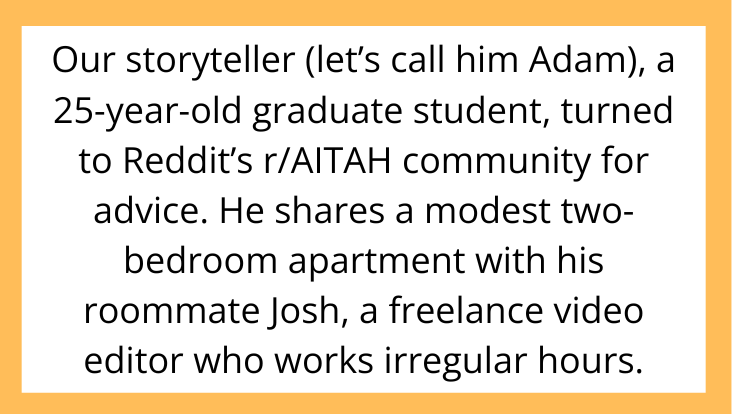AITAH for Asking My Roommate to Stop Cooking at 2AM?
Living with a roommate can be a blessing or a nightmare—it all depends on communication, boundaries, and respect for shared space. In this AITAH-inspired blogpost, we dive into a relatable conflict that’s been lighting up Reddit: one roommate’s late-night cooking habit and the other’s desperate plea for sleep.
Who’s being unreasonable—and who’s just trying to survive?
The Story: Sleepless Nights and Sizzling Pans

Our storyteller (let’s call him Adam), a 25-year-old graduate student, turned to Reddit’s r/AITAH community for advice. He shares a modest two-bedroom apartment with his roommate Josh, a freelance video editor who works irregular hours.
For months, Adam has been waking up at odd hours to the smell of garlic, the clang of pots, and the hum of the microwave. Josh frequently cooks full meals around 1 or 2AM—complete with frying pans, blenders, and reheated leftovers.
At first, Adam tried to ignore it. Then he tried noise-canceling earbuds. Finally, after another night of being woken up by the smell of shrimp stir-fry at 2:30AM, he confronted Josh.
The Confrontation: “Can You Cook Earlier?”

Adam asked Josh to try cooking before midnight or prep meals in advance. He explained that the late-night noise and smells were disrupting his sleep and affecting his academic performance.
Josh didn’t take it well.
He said that as a night owl who works until dawn, late-night meals are part of his lifestyle. He pays half the rent and insists he has every right to use the kitchen whenever he wants. His exact words, according to Adam, were:
“If you’re that sensitive, maybe dorm life would suit you better.”
Feeling unheard, Adam turned to Reddit: AITAH for asking my roommate to stop cooking in the middle of the night?
Reddit Responds: Is Adam Out of Line?

The AITAH subreddit did what it does best: dig deep into the nuance.
Most Users Sided with Adam
The consensus? NTA (Not The Ahole)**.
-
Shared spaces require shared respect. One person’s habits can’t dominate a communal living environment.
-
There’s a compromise to be made. Nobody is asking Josh to starve—just to be mindful of timing, noise, and strong smells.
One top comment read:
“It’s not about who pays rent. It’s about coexisting. Frying onions at 2AM when someone’s trying to sleep next door? That’s inconsiderate, period.”
A Few Defended Josh
Some users did empathize with Josh’s lifestyle:
-
Freelancers often live on unconventional schedules.
-
If cooking is part of his wind-down routine, it may be hard to shift it entirely.
However, even those defending Josh acknowledged that using quieter appliances or preparing meals ahead could be a reasonable compromise.
The Bigger Issue: Communication and Compromise

This story goes beyond pots and pans. It’s about how roommates handle conflict and respect personal boundaries.
Late-night noise is a common tension in shared living spaces. Whether it’s music, gaming, or cooking, the golden rule remains: don’t disturb someone’s sleep.
Here are a few practical steps roommates like Adam and Josh can take:
Set Ground Rules Early
A simple sit-down conversation early on could prevent months of passive resentment.
Use Shared Calendars or Quiet Hours
Establishing quiet hours (e.g. 11PM–7AM) is common in dorms and co-living setups—and for good reason.
Be Willing to Meet Halfway
Josh could meal prep or reheat food more quietly. Adam could use a fan or white noise machine to reduce disruptions. Neither person has to “win”—they just have to coexist.
Final Thoughts: Are You the Villain for Wanting Sleep?

Asking for peace and quiet during nighttime hours doesn’t make you unreasonable. It makes you human.
Living with others means compromise. If one person’s habits constantly disrupt the other’s well-being, it’s time to talk—not accuse.
Adam isn’t wrong for asking for consideration. Josh isn’t wrong for being a night owl. But both are wrong if they choose not to respect each other’s needs.



